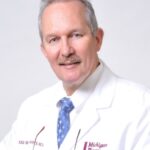Dr. Lee Colony In: Breast Augmentation

Breast augmentation remains the most popular plastic surgery procedure performed each year, so if you’re considering surgery, you’re in good company. With so much popularity, it’s normal to skip the research and go straight for the consultation. However, breast augmentation is still a major surgery and it’s essential to know what you’re getting into. Consulting a board-certified plastic surgeon like Dr. Lee Colony is the most important step. There, you can learn more about the procedure and what you can expect. But in the meantime, here’s a guide to breast augmentation, the procedure, some choices you’ll make along the way, and whether it’s right for you.
What is Breast Augmentation Surgery?
Breast augmentation, or breast enlargement, is a cosmetic surgery that enhances breast shape and size using biocompatible implants. It’s the most effective way to make the breasts larger, rounder, and more pronounced and offers a surprising amount of customization. It’s popular with women who have flat or uneven breasts, underwent pregnancy, or simply want better projection. Whatever your reason for pursuing a breast augmentation procedure, Dr. Colony can help you take the next steps.
Am I A Good Candidate?
You’re likely a good candidate if you want bigger breasts. However, you should also be in good overall health and able to take a few weeks off for the recovery process. You should have realistic expectations about your results and good reasons for pursuing surgery (for example, nobody is pushing you to augment your breasts). Finally, you should have no history of excessive scar tissue, reactions to anesthesia, or immune system dysfunctions. Dr. Colony will review these factors in detail during your consultation.
What Implant Options are Available?
Two types of breast implants are available. Saline implants are a silicone shell filled with sterile salt water. They can be more easily implanted with a small incision but can cause visible rippling if you don’t have sufficient breast tissue. Silicone implants are a silicone shell filled with silicone gel. They can provide a more natural appearance and feel, but may require extra monitoring to check for ruptures.
Additional options are available, such as placing the implant beneath the pectoral muscle or on top of it, incision options, as well as the size of your implants (breast implants range in a variety of sizes). Including a breast lift procedure is another option to consider if you have sagging breasts. Dr. Colony will walk you through choosing the right implant type and placement for your goals.
What Happens During Surgery?
Before your procedure, you’ll have a detailed discussion with Dr. Colony about the risks of breast implants. More commonly, these include capsular contracture or bleeding risks. Exceedingly rare risks can include breast implant illness or even anaplastic large cell lymphoma. These risks can be mitigated by choosing a board-certified plastic surgeon who can provide up-to-date information.
Breast augmentation is performed using general anesthesia. Your breast augmentation surgeon, Dr. Colony, will create a predetermined incision in each breast. From there, the implants are placed within a pocket created in the breast tissue. Once in place, the incisions are closed and you’ll be fitted with a surgical bra to wear throughout your procedure.
What is Recovery Like?
Initial recovery is 1-2 weeks, during which you’ll need to limit your activity and focus on resting. Make sure to wear your surgical bra as much as possible – it helps support the implants and relieve pressure from the incisions. Within 2-4 weeks, you can gradually begin returning to strenuous exercise. Your implants may seem too high on the chest at first, but they’ll gradually drop and settle into their final position. This can take about two-six months. Within a year, your scars should fade – Dr. Colony can give you recommendations on products to help the process.
At about 4-6 weeks after surgery, you can begin to appreciate your results, with noticeably fuller, rounder breasts. With proper monitoring and good aftercare, your results can last 20 years or more.
Breast Augmentation Surgery in Lansing, MI
To meet with Dr. Lee Colony and learn more about your breast surgery options, contact our East Lansing office today by calling or filling out our online form.
What is Breast Augmentation Surgery?
Breast augmentation, or breast enlargement, is a cosmetic surgery that enhances breast shape and size using biocompatible implants. It’s the most effective way to make the breasts larger, rounder, and more pronounced and offers a surprising amount of customization. It’s popular with women who have flat or uneven breasts, underwent pregnancy, or simply want better projection. Whatever your reason for pursuing a breast augmentation procedure, Dr. Colony can help you take the next steps.
Am I A Good Candidate?
You’re likely a good candidate if you want bigger breasts. However, you should also be in good overall health and able to take a few weeks off for the recovery process. You should have realistic expectations about your results and good reasons for pursuing surgery (for example, nobody is pushing you to augment your breasts). Finally, you should have no history of excessive scar tissue, reactions to anesthesia, or immune system dysfunctions. Dr. Colony will review these factors in detail during your consultation.
What Implant Options are Available?
Two types of breast implants are available. Saline implants are a silicone shell filled with sterile salt water. They can be more easily implanted with a small incision but can cause visible rippling if you don’t have sufficient breast tissue. Silicone implants are a silicone shell filled with silicone gel. They can provide a more natural appearance and feel, but require extra monitoring to check for ruptures.
Additional options are available, such as placing the implant beneath the pectoral muscle or on top of it, incision options, a well as the size of your implants (breast implants range in a variety of sizes). Including a breast lift is another option to consider if you have sagging breasts. Dr. Colony will walk you through choosing the right implant type for your goals.
What Happens During Surgery?
Before your procedure, you’ll have a detailed discussion with Dr. Colony about the risks of breast implants. More commonly, these include capsular contracture or bleeding risks. Exceedingly rare risks can include breast implant illness or even anaplastic large cell lymphoma. These risks can be mitigated by choosing a board-certified plastic surgeon who can provide up-to-date information.
Breast augmentation is performed using general anesthesia. Your breast augmentation surgeon, Dr. Colony, will create a predetermined incision in each breast. From there, the implants are placed within a pocket created in the breast tissue. Once in place, the incisions are closed and you’ll be fitted with a surgical bra to wear throughout your procedure.
What is Recovery Like?
Initial recovery is 1-2 weeks, during which you’ll need to limit your activity and focus on resting. Make sure to wear your surgical bra as much as possible – it helps support the implants and relieve pressure from the incisions. Within 4-6 weeks, you can gradually begin returning to strenuous exercise. Your implants may seem too high on the chest at first, but they’ll gradually drop and settled into their final position. This can take about six months. Within a year, your scars should fade – Dr. Colony can give you recommendations on products to help the process.
At about 4-6 weeks after surgery, you can begin to appreciate your results, with noticeably fuller, rounder breasts. With proper monitoring and good aftercare, your results can last a lifetime.
Breast Augmentation Surgery in Lansing, MI
To meet with Dr. Lee Colony and learn more about your breast surgery options, contact our East Lansing office today by calling or filling out our online form.
Meet Dr. Lee H. Colony, M.D., F.A.C.S., a renowned Board Certified plastic surgeon known for his expertise in aesthetic plastic surgery. As a respected national speaker and educator, his dedication to patient safety and involvement in esteemed medical societies highlight his exceptional skills.
